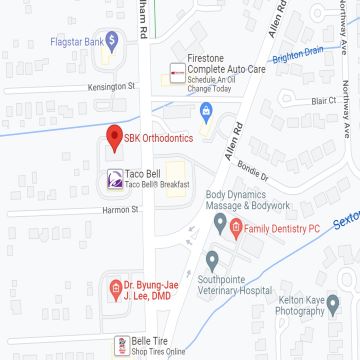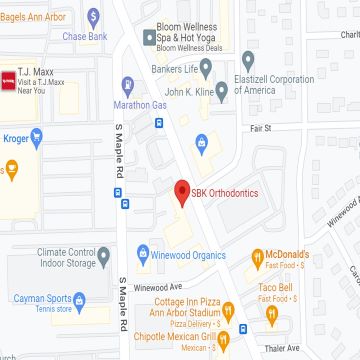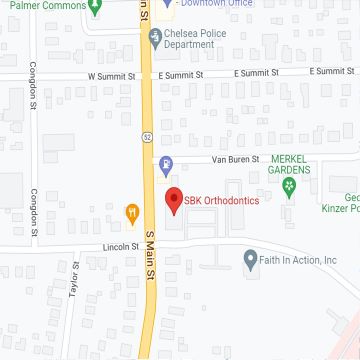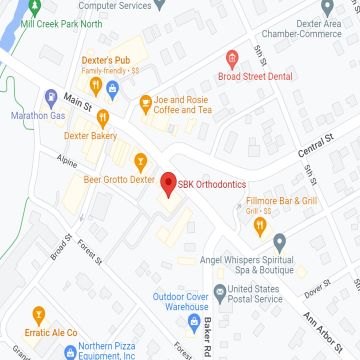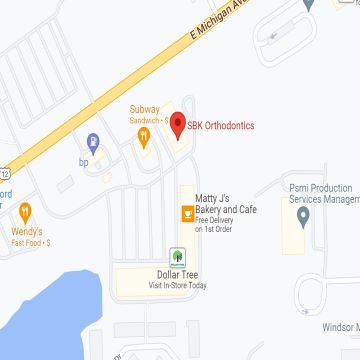How to Handle Orthodontic Emergencies?

Orthodontic emergencies are always alarming but aren’t usually life-threatening. Still, you’ll be glad to know you have an entire team at your disposal here at SBK Orthodontics whenever you have to deal with any such situations.
First things first, it’s crucial you know how to identify these situations and know how to act. Since many of these are simple complications you can wait for a little to solve, you can usually contact your orthodontist’s office and wait for your next appointment; however, other dental emergencies will require immediate emergency care from professionals.
Let’s take a closer look at some of the highlights related to orthodontic emergencies and how you should act.
Loose Brackets
We mentioned in a previous post that your choice of foods and drinks could damage your orthodontic appliances. We weren’t joking. Even though your orthodontist uses a strong bonding agent to cement your brackets to each tooth, some food pieces can still peel away the brackets.
It’s all about physics, really. Think of it this way: the bonding agent has to be strong enough to resist throughout your treatment, but when the time comes for us to remove your braces, we’d have to have a way to do so without complications.
You wouldn’t imagine a modern orthodontist pulling away violently trying to remove each bracket, right?
Instead, we just peel away the pieces, and some leftover food pieces can do the same. For instance, those of you who just can’t resist the popcorn smell when you go to the movies, and get yourself a bucket full of them, may have leftover pieces of corn kernels stuck between some teeth and the corresponding brackets. The little wedge functions as a lever and lifts the bracket, leaving it to move freely over the length of your archwire.
How to Deal With Loose Brackets?
First of all, you should make sure the bracket won’t fall off and swallow it accidentally. If the bracket is still secured to the archwire, you can just slide it to its original position and contact your Ann Arbor orthodontist for help. Likewise, you can take any blunt object and push it to the right position.
A little orthodontic wax can help cover the ceramic or stainless steel piece to avoid mouth sores. And please, do NOT attempt to superglue it back on.
Poking Wires
Another recurring scenario includes patients who have to deal with annoying poking wires. Usually, what happens is that the ends of your archwire become loose and poke at the inside of your cheeks.
This shouldn’t happen, but rough motions, worn elastics, and damage provoked by leftover food particles can all weaken the grip that holds the archwire to each bracket, creating a problematic situation. This shouldn’t be anything more than an alarming or discomforting sensation, but wires can poke at your cheeks, causing irritation and mouth sores.
What to Do About Poking Braces Wires?
The solutions are pretty simple and varied, though our main recommendation is that you contact your orthodontist to let them know you need a replacement. Try tucking away the end of the archwire that’s poking your cheeks. You can take any blunt object, such as a pencil eraser or Q-tip.
Other more adventurous patients can try clipping away the wire. Still, before you do that, try placing a napkin or cloth at the back of the patient’s mouth to prevent accidental swallowing of any wire pieces.
Lastly, a dollop of orthodontic wax will reduce discomfort as you won’t have the wire poking or rubbing the soft tissues inside your mouth.
General Pain and Discomfort
Many patients report feelings of discomfort and mild pain during the first days of treatment and following an adjustment to their braces. Such a situation is common, and all patients should expect some discomfort.
The truth of orthodontics is that we can gradually move your teeth into the right position through a constant application of force that safely dissolves jaw bone at the base of your teeth and realigns them.
You don’t have to worry, as this process is completely safe, and we make sure all your supporting structures and periodontal tissues are healthy enough prior to your orthodontics treatment with braces. Nonetheless, you might experience that discomfort, increased sensitivity to heat and cold, and feeling as if your teeth are loose.
What Can You Do About Pain With Braces?
Fortunately, you can simply buy some over-the-counter pain medication to handle the symptoms for the first few days of treatment. However, you should note that if the pain persists beyond 3 or 5 days, you should contact your orthodontist as there may be some additional problem going on that requires immediate attention.
Regardless of how long, or short, it’s been since you got your braces, if the pain you feel is above any normal discomfort you might have expected, you should contact your orthodontist, general dentist, or emergency services for the timely help you require.
What Is a True Dental Emergency?
Unlike orthodontic emergencies, dental emergencies can be extremely severe or even life-threatening. You should never disregard feelings of discomfort or pain when they exceed what you can usually handle.
Pain in the lower part of your face, shooting pain from your jaws to the top of your head, redness, swelling, and continuous bleeding can all be symptoms of ongoing dental emergencies.
One common case is an abscess that can result in infections, additional complications, and worse. Please, contact Ann Arbor emergency services if you notice any of the symptoms above to prevent any unwanted results.
Get Help From Your Ann Arbor Orthodontist
Everyone at SBK Orthodontics wants to help you achieve your desired smile. We hope you learned some valuable information about what is a true orthodontic emergency and how to deal with it.
When in doubt, contact our office or call us at 734-662-7200 for proper help. We’ll gladly help you solve your emergency and set an appointment for a more permanent fix as soon as possible.




